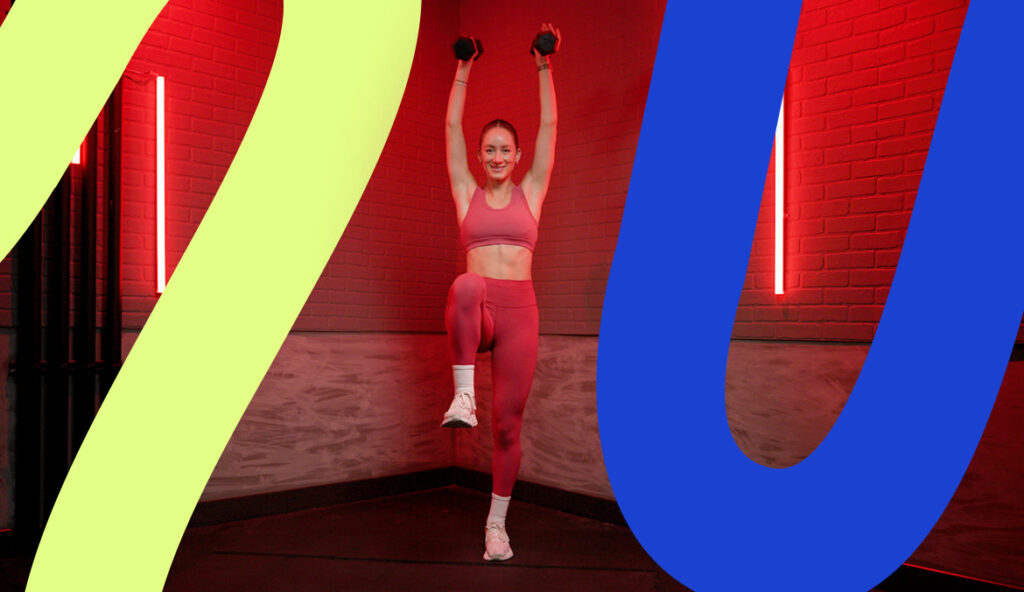The Only 6 Dumbbell Balance Exercises You Need

[ad_1]
Incorporating dumbbells into your workout routine not only builds strength but also challenges your body to maintain stability under uneven loads. This subtle yet effective shift can significantly improve your coordination and proprioception, making you more adept at handling the physical demands of daily life.
From carrying groceries to navigating uneven sidewalks, better balance makes everything easier. “I say this all the time—balance will keep us young!” says Izzi Lynn, instructor at Barry’s Bootcamp and host of our Movement of the Month Club focusing on dumbbells.
“This workout challenges both the upper and lower body with uneven loading of weight. It’s a great addition to any workout routine to keep your body primed to move safely in all directions.”
Join the movement
If you’re following along with our July 2024 Movement of the Month Club, these are the moves for week 1. You’ll do one of these dumbbell balance exercises each day, Monday through Saturday, really focusing on getting your form right. (But you can do this workout anytime!)
Then on Sunday, you’ll do the full workout. You’ll do each move on one side for 60 seconds, then take a 60-second break. Repeat on the opposite side, again for 60 seconds each move.
Here are your dumbbell balance exercises
1. Reverse Lunge With Knee Drive
This combo exercise works in two parts: A lunge that strengthens your glutes, hamstrings, and quads, and a knee drive that engages the core and improves balance and coordination.
- Stand with your feet hip-width apart, holding a dumbbell in each hand at your sides.
- Take a step back with your right foot, landing on the ball of your foot and bending both knees to lower your body until your left thigh is parallel to the floor and your right knee is nearly touching the ground.
- Push off your right foot, bringing it forward and upward. As you stand, drive your right knee up toward your chest.
- Lower your right foot back to the starting position.
- Perform the movement on the left side, continuing to alternate legs for 60 seconds.
2. Overhead March
Even think marching could be a full-body strength exercise? This dumbbell balance exercise is! It improves core stability and posture by challenging your ability to maintain balance with a weight overhead. It also targets the shoulders and arms because of the extended hold, while the leg movement engages the lower body.
- Stand with your feet hip-width apart, holding a dumbbell in each hand above your head with your arms fully extended. Make sure your core is tight.
- Lift your right knee up toward your chest while keeping the weight stable above your head. Ensure your back is straight and your core remains engaged.
- Lower your right leg back down, then raise your left knee to your chest, maintaining the weight’s position throughout.
- Continue to alternate legs for 60 seconds at a steady pace, mimicking a marching motion while keeping the weight overhead for the entire duration.
3. Lateral Lunge
Anyone looking to improve their agility and multi-directional movement skills needs to do lateral lunges. They target the muscles in your thighs and hips, particularly the adductors, which are often neglected in more traditional forward and backward leg movements.
- Stand with your feet together, holding a dumbbell in each hand at your sides.
- Take a large step out to the side with your right foot, keeping your toes pointed forward and your feet flat on the floor.
- As you step out, bend your right knee and push your hips back, framing your knee with your dumbbells and lowering your body until your right thigh is parallel to the floor (or as far as you can go). Keep your left leg straight and your chest lifted.
- Push off your right foot to return to the starting position.
- Repeat the movement on the left side, continuing to alternate sides for 60 seconds.
4. Weighted Drag
Amp up your standard plank with the weighted drag, which challenges your body to maintain balance and alignment in a plank while moving a dumbbell from side to side.
- Start in a high plank with two dumbbells on the floor beside your hands, or, if your dumbbells are big enough, hold a dumbbell in each hand.
- Grab a dumbbell with your left hand and drag it under your body to your right foot.
- Drag the weight back to the starting position. Switch sides.
- Continue alternating the drag from one side to the other for 60 seconds.
5. Rainbow Lunge
Rainbow lunges add a dynamic and functional twist to traditional lunges, as well as an endurance challenge.
- Stand with your feet together, holding a dumbbell in each hand at your sides.
- Take a step back with your right foot into a reverse lunge.
- Move the right foot behind the left leg into a curtsy lunge.
- Return to a reverse lunge, then switch sides, repeat the movement with your left leg.
- Continue alternating sides for 60 seconds.
6. Plank Shoulder Tap With Hold
This plank variation strengthens your shoulders and arms, while enhancing coordination, making it ideal for improving overall upper-body stability.
- Start in a high plank with your hands under your shoulders and feet hip-width apart.
- Lift your right hand and tap your left shoulder, holding this position for 3 seconds.
- Return your right hand to the floor and repeat the motion with your left hand tapping your right shoulder.
- Continue alternating taps for 60 seconds, maintaining a stable and controlled body position throughout the exercise.
[ad_2]




